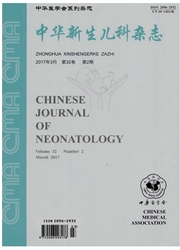

 中文摘要:
中文摘要:
目的总结超未成熟儿及超低出生体重儿发生的原因、相关影响因素及转归情况。方法分析内蒙古医科大学附属医院2009年1月至2015年12月NICU收治的符合条件的103例超低出生体重儿及超未成熟儿的临床资料,包括母孕期病史、新生儿出生时情况、诊治经过及预后。结果103例患儿存活67例,死亡36例,存活率65.0%(67/103)。妊娠高血压综合征、感染、胎膜早破等为发生超未成熟和超低出生体重儿的主要因素,影响两者的转归因素包括胎龄、性别、出生体重、肺出血、支气管肺发育不良、坏死性小肠结肠炎(P〈0.05)。长期住院的存活患儿后期易并发贫血。死亡直接原因前4位包括肺出血、呼吸窘迫综合征、新生儿肺炎及坏死性小肠结肠炎。结论加强高危妊娠监测管理,预防早产,加强NICU超未成熟儿及超低出生体重儿的监护管理,及早发现、及早处理各种并发症,防止医院感染发生,是提高两者存活率,改善生活质量的根本措施。
 英文摘要:
英文摘要:
Objective To summarize the causes,related factors and outcome of extremely premature infants and extremely low birth weight infants. Methods One hundred and three cases of extremely prema- ture infants and extremely low birth weight infants were admitted to First Affiliated Hospital of Inner Mongo- lia Medical University between January 2009 and December 2015. The study was performed to analyze the clinical data of the 103 cases, included history of pregnancy, birth situation, treatment and prognosis. Results In these 103 cases,67 infants survived,36 infants died. The survival rate was 65.0% (67/103). The ex- tremely premature infants and extremely low birth weight infants were mainly associated with pregnancy-in- duced hypertension, infection, premature rupture of membranes. Factors that could affect the outcome of these cases included gestational age, sex, birth weight, pulmonary hemorrhage, bronchopulmonary dysplasia and ne- crotizing enterocolitis ( P 〈 0. 05 ). The survival infants with long-term hospitalization often complicated with anemia. The top four causes of the death mostly were pulmonary hemorrhage, pneumonia, neonatal respiratory distress syndrome,and necrotizing enterocolitis. Conclusion In order to reduce the incidence of extremely premature infants and extremely low birth weight infants, improve the survival rate and infants quality of life, we should monitor the high-risk pregnant women closely during pregnancy period, prevent and treat all kinds of complications and prevent the occurrence of nosocomial infection.
 同期刊论文项目
同期刊论文项目
 同项目期刊论文
同项目期刊论文
 期刊信息
期刊信息
